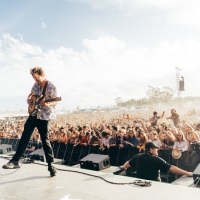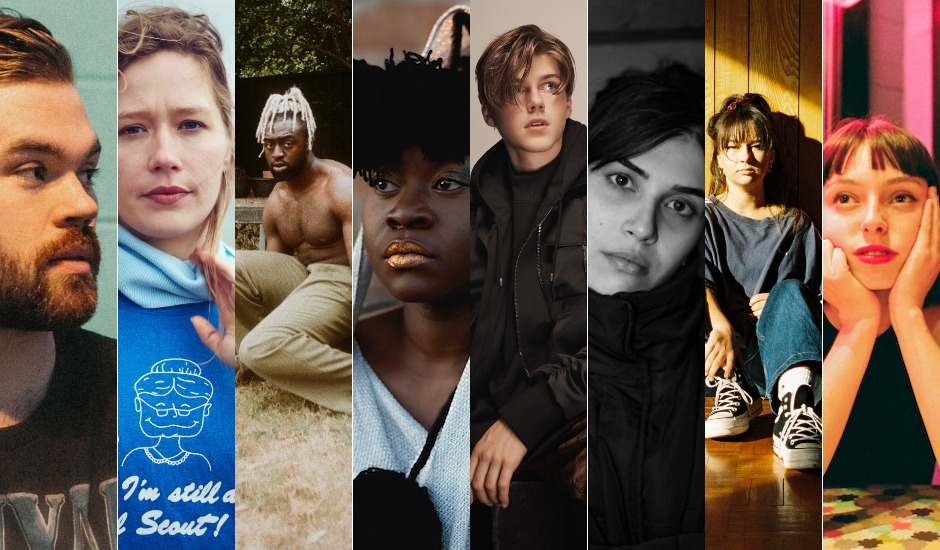 How Grapevine Gathering uses Australia's rising talent to flourish and expandWhile their debut year in Perth was topped by international heaviness, the heavy movers shining early on were all local talent.
How Grapevine Gathering uses Australia's rising talent to flourish and expandWhile their debut year in Perth was topped by international heaviness, the heavy movers shining early on were all local talent.

Meet the musicians who defined Australian music in 2019
In our latest feature, we explore the acts that made Australian music stand-out in 2019.
I feel like we say this almost every year, but in 2019, Australia's music scene stepped up a notch. Regardless of genre, Australia's presence in the international music sphere felt more prevalent than ever this year - a feat, considering many of our biggest names, from Tame Impala to RÜFÜS DU SOL, didn't put out records. Instead, we got a glimpse of the next generation - the next frontier of Australian music - and the plethora of talent it holds, as well as how it's easier than ever for these artists to find a place in a constantly-changing, global music world.
In 2019, Australian musicians redefined exactly what music can mean. Artists like Sampa The Great and Kaiit dissected themes of home and empowerment on career-best music that netted them ARIA Awards - the first females ever, to win in a hip-hop/R&B-leaning category - while others, such as Stella Donnelly and Julia Jacklin, branded a rising pocket of music that went viral with a tweet earlier this year: "My favourite genre of music is women pissed off with the world."
With a new Flume mixtape and a string of high-tier singles, Australia's electronic scene was always set to thrive this year, but no-one saw Dom Dolla becoming the face of it - the Melbourne producer riding a tech-house tsunami and finally getting some acclaim after years of being a local club favourite. Elsewhere, musicians like Cub Sport and Ruel brought a sense of stan culture to Australia - and fairly so - while acts like Northlane and WAAX defined the heavier brand of rock, and how broad and down-right exciting it can be.
Here, we explore the artists that defined Australian music and its brilliance across the past year. Strap in - it's a great list.
Sampa The Great, ONEFOUR, Kwame and Kaiit:
It's no secret that 2019 has been the year of hip-hop (much like 2018, too), whether it be the returns of newly emerging greats - Tyler, The Creator, Kanye West, Young Thug - or musicians seemingly bursting out of nowhere with glimpses of virality turned into fully-fledged careers, like Lil Nas X and JPEGMafia, for example. Australia's rap scene isn't often discussed in the international sphere, but in 2019, it finally felt like we were being recognised by both those overseas and at home, and these artists - Sampa The Great, ONEFOUR, Kwame and Kaiit - were a large part in making that happen.
Zambia-born, but Melbourne-based rapper Sampa The Great is an obvious choice. With her debut album The Return this year, Sampa The Great proved that Australia's hip-hop scene can be as complex and meaningful as heavyweights overseas - Solange, Ms Lauryn Hill - and in the process, put out a record that's easily the year's best. Even despite spanning a long-winding 19 tracks, The Return is simply sublime; a dissection of what 'home' means to an artist finding success so far away from her Zambian upbringing, brought to life though clapping hands and gentle R&B grooves.
ONEFOUR, meanwhile, represent an entirely different side of Australian hip-hop. With a string of singles capped off with their career-exploding In The Beginning a few weeks back, the collective of rappers from Western Sydney's Mt Druitt are now among the country's most recognised. In 2019, a year marked with their endless battles against a policing government, ONEFOUR have emerged as a voice - as an example - for rappers trying to pick themselves off the street and find success through rap music, with their fight to play stretching far into international waters.
The last two musicians - Kwame and Kaiit - are nominated for their musical excellence. After finding national success with last year's Endless Conversations. EP, this year has welcomed the reckoning of Sydney rapper Kwame, with success after success after success showcasing his ability to grasp at hip-hop's most notorious sounds and make them his own. As a result, he's the inaugural signing to highly-influential label Def Jam's AU/NZ venture, and with a new EP arriving in 2020, it's clear that Kwame is going to highly influential to Australia's rap market in the decade ahead.
Kaiit, meanwhile, represents the emergence of Australian R&B as a distinct, fully-formed sound - so much so that ARIA's controversial 'Best Urban Release' package was split, to represent the foundations of a bustling Australian hip-hop and R&B sound. She's only released one single in 2019 - Miss Shiney - yet Kaiit's impact on swirling R&B has been felt throughout the year, largely through her ability to inspire a collection of artists next-up: Milan Ring, Caiti Baker, Miiesha and the list continues.
Angie McMahon, Stella Donnelly, Julia Jacklin and Hatchie:
In songwriting, personal storytelling can be difficult. You have to embrace and dissect the complexities of moments amongst the lowest of lows - heartbreak, loss, assault - and put them out into the world to be dissected once again by a particular vicious social media culture, and in interviews, you're often spent recounting that period of your life time and time again. As such, it's a feat in itself when an artist releases an album thick with it, let alone some amongst the most intimate and brilliant of the year - something shared by Angie McMahon, Stella Donnelly, Julia Jacklin and Hatchie in 2019.
Angie McMahon is an easy choice. Her debut album, this year's Salt, is a collection of tracks as relatable as they are laden with hyper-personal anecdotes; a rich sense of storytelling amplified by stripped-back and subtle instrumentals that give her lingering vocals room to truly flourish - and that they did. Whether it's the touching Soon, the empowering And I Am A Woman or Pasta (which sits amongst the year's best songs), Angie McMahon's Salt is an experience, and one that'll leave you a jaw-dropped shell of a human being by the time it's wrapped up.
Stella Donnelly, meanwhile, has come a long, long way since emerging as a fresh face of Perth indie-pop. Her debut album, Beware of the Dogs, is a combination of biting lyricism and gentle instrumentals that do what Stella Donnelly do best: take some really quite messed up stories over the years, and charade them underneath happy-go-lucky melodies. One minute, you're enjoying a seemingly uplifting indie tune that makes it obvious why Stella's been so embraced this year, the next minute, you're realising it's a track about fighting down old men at the top of the feeding chain.
Julia Jacklin's record, meanwhile, is down-right devastating. Crushing, released closer to the start of this year, sees the Sydney musician dissect the complexities of a break-up in tracks that leave you completely forward, from those that feel like an "elongated sigh" (Body), to those which capture the sheer emotion of a musician recalling one of the most difficult times in her recent life, as shown on Don't Know How To Keep Loving You. Even revisiting the album now, months later, brings just as much punch as it did on day-dot. It's a special album.
Finally, comes Hatchie. The Brisbane-raised shoegaze-pop musician was labelled a rising star of dreamy pop just two years ago, but her debut album - June's Keepsake - has taken her to an entirely different level. She's become an indie darling in the US and UK and is a constant shining of example of the brilliance within Australia's indie-pop scene that, together with Julia, Stella and Angie, represent an incredibly bright, female-powered future for Australian music.
Cub Sport, Ruel, Mallrat, Tones And I:
With the social media domination in music at the tail-end of this decade, one by-product that's been talked about more than any other is stan culture. Particularly prevalent on Twitter, stan culture is something typically on held by the biggest of pop stars - Ariana, Gaga, Beyoncé - yet, it seems that a collection of artists are being caught up in the phenomenon too, and in the process, are building international audiences online that rival that of musicians whose careers extend for years and years. Cub Sport, Ruel, Mallrat and Tones And I are artists that have seen the highs - and often the lows - of stan culture, welcomed into the niche pocket of acts to have a captivated audience thanks to their ability to make pop music that really transcends what's already out there.
Cub Sport is a brilliant example. Their latest record, January's self-titled effort, was their most successful date and how could it not be? It was a slick, remarkable record full of nuance and storytelling; the love of frontman Tim Nelson and keyboardist Sam Netterfield on feature display that, quite naturally, has welcomed one of music's strongest LGBT+ audiences, one that gets around the band and their successes at every turn. Their story is one that a lot of people over the years have found comfort and hope in, and with new music lingering at every turn, we can see Cub Sport being just as influential in 2020.
Ruel, however, is an entirely different force. The rising star has been a local favourite for a few years now - since 2017's M-Phazes-assisted Golden Years - but the last year has been transformative for Ruel; his latest release, the seven-track Free Time EP back in September, has millions and millions of plays on every track. He has one of the strongest audiences online of any emerging act full-stop, and his moves over the last year - picked by Shawn Mendes to support him around the country, for example - ensures that he'll transform to become one of Australia's biggest acts in the new decade.
Mallrat is similar. Her take on pop music is rich with intimacy and relatability uniting, and a constant stream of work ever since her debut - like September's Driving Music, her latest EP for example - ensures that she never quite disappears from the limelight. While she may be yet to put out an album and her audience doesn't quite reach the size of Ruel's above, Mallrat is a glimpse of the future in present-day. She's still young and full of the same potential that pushed her out of Brisbane in the early days, but now, years into her career, we're seeing this potential starting to blossom into something special.
Finally, comes Tones And I. To be clear, not a single Australian act in 2019 was bigger than Toni Watson. As we've explored, she's grappled with the difficulties of finding sudden online fame, but she's also seen the other side of it too: she has the most successful Australian single in history - going off chart data - while she's also one of the biggest female acts to break in the UK and Europe sectors too; the former of which, she's been number one in for months now. She's climbing in the US too, and doesn't seem to be slowing down at all, so it's easy to see Tones in the future of Australian music.
Dom Dolla, CC:DISCO! and Mansionair:
Australia's place in the global dance scene is interesting. On one side, there are a collection of Australian artists which have seemingly completely migrated to international waters, and thrive there on every level - Flume, Alison Wonderland, RÜFÜS DU SOL and so on. On the other, there's the niche pocket of producers - typically in the more trap-esque, rap-influenced sound - that always seem to capture US audiences more-so than back home, teetering on the edge of being able to join the former category if they were to release a solid, cohesive track. These musicians, however - Dom Dolla, CC: DISCO!, Mansionair - makes it feel like things are changing.
Dom Dolla, to start, is somewhat of an unexpected success story for the year. Pushed forward in the hands of FISHER and Chris Lake, there's a looming avalanche of tech-house in every dance music market, and it's making stars out of unsuspecting musicians like Dom, who for the better part of the last decade, has been crafting a status as a Melbourne go-to. Nowadays, it's almost impossible to not here a Dom Dolla song in a club setting, and singles like San Frandisco - and his recent remix of Dua Lipa's Don't Start Now - proves that this rising energy is translating through to his recorded work too.
CC:DISCO!, meanwhile, represents Australia's presence in DJ culture. Although a now-notorious mainstay of the Australian club world, CC:DISCO!'s reach is expanding internationally too, becoming one of Europe's most successful rising stars after a stint in Portugal over the European summer, and listing her 2019 highlights presents a list metres long: launching a Rinse FM program, playing Glastonbury Festival (!), and being named one of the year's break-out DJs by influential dance music magazine Mixmag just the start.
MANSIONAIR is another somewhat expected hero of 2019, having been well-familiar among the Australian electronic world for a few years now. In 2019, however, they blossomed to become one of the country's dominative electro-pop powerhouses; their debut album, this year's Shadowboxer, being a 16 tracks a long time coming, each encapsulating the brilliance of the group in a long-awaited album format thick with versatility and creativeness. They've also been nominated for a GRAMMY alongside ODESZA, played a bunch of world's biggest festivals, and is quickly becoming the next Australian act to find greater success internationally than back home.
Northlane and WAAX:
Once upon a time, the global perception of Australian music was based solely on its rock scene, through acts like AC/DC. Skip forward twenty years, and although we may not have a rock band the size of AC/DC spreading the local 'heavy' gospel in international waters (the closest to, is probably Parkway Drive), there's an incredibly exciting and rich future of the genre that, in 2019, we finally got a good grasp on. For us, WAAX and Northlane are two acts which represent Australia's heavy music today, and where it can go in the future: important, inclusive, built on songwriting and pain, but still bloody great.
Dismissing Northlane as this year's peak in metal/metalcore is a near-crime. Their fifth album, this year's Alien, is an incredibly deep and personal detailing by frontman Marcus Bridge, who breaks down his story out of hell - coming from a low-income background, rich with drug abuse and crime - and his ability to turn it into something remarkable. Alien isn't just a great metal album, it's also one that comes with a message - one that felt particularly strong in the current climate: no matter where your origin, no matter from what you came, you can always strive and become something big.
WAAX, meanwhile, represent another side of Australia's rock world. With their debut album Big Grief, the group - especially their frontwoman, Maz - showed that Australian rock doesn't have to be what defined it in the past. In a scene built so heavily from the white male, WAAX's presence alone means something to Australian music in 2019, let alone the fact that the album they defined it with, is amongst the best debut from an Australian act in recent memory. WAAX are an all-class act, and it's so exciting to see them blossom following a time where, in the past, they'd be at a disadvantage just because of their image.
Who have we missed?
Follow Pilerats on socials to keep an eye out on these names in the years ahead, and find out who'll be the people defining the years ahead: FACEBOOK / TWITTER / INSTAGRAM.
 How Grapevine Gathering uses Australia's rising talent to flourish and expandWhile their debut year in Perth was topped by international heaviness, the heavy movers shining early on were all local talent.
How Grapevine Gathering uses Australia's rising talent to flourish and expandWhile their debut year in Perth was topped by international heaviness, the heavy movers shining early on were all local talent.
 Long Live Death Disco: Recapping 13 years of Perth's long-running club nightAfter spanning over a decade, the club night - held at present-day Amplifier / Capitol - will close on December 28th.
Long Live Death Disco: Recapping 13 years of Perth's long-running club nightAfter spanning over a decade, the club night - held at present-day Amplifier / Capitol - will close on December 28th.